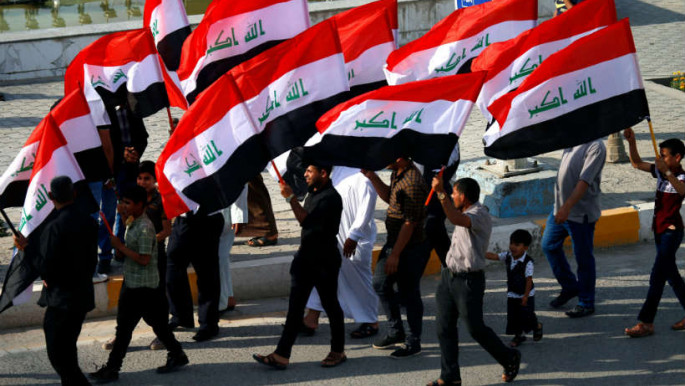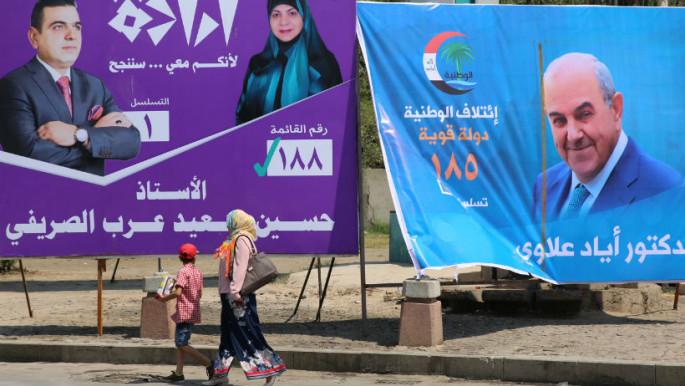The Iraq Report: The continuing sexual abuse of displaced women and children
Click here to receive The Iraq Report each week in your inbox
International human rights organisations have long reported on the abuses faced by Iraqi prisoners and minorities at the hands of militias and government agencies. Prisoners are routinely subject to mistreatment, inhumane conditions, torture, sexual abuse and threats of rape - particularly of female family members - in order to extract confessions over terrorism offences, crimes punishable by death in Iraq.
But these abuses have continued into a new realm, with the victims primarily women and children accused of being related to fighters belonging to the Islamic State group.
As Iraq’s humanitarian situation continues to slide, its regional political situation has felt a brief flash of heat as the United States, United Kingdom and France bombed chemical weapons facilities in neighbouring Syria. While this did not directly impact Baghdad, it indirectly drew the Iraqis further into the Syrian conflict as the US-led military action affected its main ally, Iran, which is one of the staunchest allies of the Assad regime in Damascus. The strikes exposed once again Iraq’s vulnerability to any action that affects Iran, as Baghdad-based ministers sharply disagreed on whether to openly side with Tehran or to stay quiet.
Women, children accused of links to IS suffer abuses
Iraqi women and children accused of being linked to Islamic State group militants are being denied humanitarian aid, prevented from returning to their homes, and subjected to sexual abuse and violence, Amnesty International said on Tuesday.
According to the report, 92 women were interviewed across eight displacement camps in the northern Iraqi governorates of Nineveh and Salahuddin. Amnesty found that women and children were suffering grave abuses and being denied their human rights on the mere suspicion of being related to IS militants.
“Women and children with perceived ties to IS are being punished for crimes they did not commit,” said Lynn Maalouf, Amnesty’s head of Middle East research. “This humiliating collective punishment risks laying the foundation for future violence.”
According to Amnesty, those women and children who have made it back to their hometowns have faced being robbed, evicted from their homes and abuses “including sexual abuse and sexual harassment”.
Read more: Islamic State families struggle with life after 'the caliphate'
Throughout the war against IS, from early 2014, with the group declared “defeated” last December, government soldiers and Baghdad-aligned, Tehran-backed paramilitary Shia Islamist militants have been accused of targeting and killing Sunni Arab men due to their sectarian identity, while branding them as IS militants to avoid accountability.
During the fighting to recapture the western city of Fallujah in 2016, 643 men were abducted, tortured and forcibly disappeared, never to be seen again. At the time, Al Jazeera reported horrific human rights violations and the testimonies of Sunni detainees who said that Shia Islamist militants from the Popular Mobilisation Forces (PMF), or Hashd al-Sha’abi, in Arabic, had taken turns to torture them.
Abuses included beating detainees with pipes, flogging them with steel wire, and civilians being slaughtered “like chicken”. These reports were corroborated by independent monitors, including Human Rights Watch and Amnesty.
 |
| Iraqis take to the streets in protest at the Western airstrikes in Syria [AFP] |
Many of the men killed after being accused of being IS members were never put on trial and never had the opportunity to defend their case. The slain men left behind families, including many of the women who are now struggling to survive due to the stigma of allegedly being related to an IS militant.
Physical and sexual violence being perpetrated against women and children who are not responsible for IS militancy is an issue that will likely engender a new generation of violence. The rise of IS was precipitated by severe government human rights abuses, sectarianism and a lack of accountability for security forces and allied pro-Iran militias who perpetrated actions that may amount to war crimes and crimes against humanity.
Violence still the norm as elections loom
While Iraq continues to lose ground in the struggle for human rights, transparency and accountability, politicians are focusing their energies on what is already shaping up to be a divisive campaign to win seats in the local and national elections on 12 May.
Campaigning began on Saturday, with some candidates already embroiled in controversy after their aides pulled down posters bearing the images of slain Iraqi soldiers and PMF fighters who died during the fighting against IS. The posters were replaced with promotional images and canvases of candidates for political office, enraging some supporters of the PMF.
“At midnight sharp, they began pulling down pictures of the martyrs and replaced them with posters of the thieves,” said Baghdad resident Settar Tourki.
Despite their history of human rights violations, many Iraqis - particularly from the Shia Arab community - support the PMF and regard their dead as “martyrs” in the fight against IS. Many Iraqis also consider their political class to be opportunistic thieves, particularly after the head of the parliamentary anti-graft committee admitted to the Guardian in 2016: “Everybody is corrupt, from top to bottom. Including me.”
The Iraqi government has also been unable to prevent suicide bombers from targeting political parties and campaign offices.
A car-bomb attack in the multi-ethnic city of Kirkuk targeted the convoy of Ammar Kahya, a candidate for the Iraqi Turkmen Front and a close ally of the PMF, on Sunday. One person was killed, while eleven others were wounded, although Kahya survived the attempt on his life.
Earlier this month, suicide bombers disguised as Iraqi soldiers entered the main headquarters of the al-Hal Party in the western city of Hit and detonated their explosives, killing four people and injuring several others. One of those wounded was parliamentary candidate Zainab Abdel Hamid al-Hiti.
 |
| Around 7,000 candidates are standing in the May 12 elections [AFP] |
While no group has claimed responsibility for these attacks targeting parliamentary candidates, the Islamic State group has declared that it was behind a bomb attack last Thursday that killed 25 and injured 18 at a funeral of PMF militants. The bombing is likely to be viewed as a revenge attack, and IS may use it as propaganda to claim they are avenging those innocents tortured and killed by PMF fighters.
With security still elusive, and armed groups seeking to disrupt elections they either deem to be against their worldview or illegitimate for political reasons, the results of the elections are likely to be sectarian in nature. Fearing attacks by sectarian groups, Iraq’s various demographics are again poised to vote for their own kind rather than political manifestos offering improvement to their lives. Considering millions of Iraqis are still displaced - largely Sunni Arabs - this year’s vote may see a shift to more Shia Arab lawmakers winning seats.
Abadi loses control of top diplomat over US-led Syria strikes
While Prime Minister Haider al-Abadi has been at pains to point out that his government is independent of Iranian influence and free to forge ties with any country it wanted, his cabinet members have different ideas - and apparently directly ignored his orders regarding the US, UK and French attack on Syrian chemical weapons facilities last Saturday.
Following the tripartite strikes, Iraq’s foreign ministry was quick to side with regional ally and benefactor Iran, warning that western airstrikes were a “very dangerous” development that could fuel a “jihadist resurgence” in the region.
A statement by foreign ministry spokesman Ahmad Mahjoub said the strikes were “a very dangerous development… that will provide an opportunity for the expansion of terrorism after it was destroyed in Iraq and largely pushed back in Syria”.
Firebrand Shia cleric Muqtada al-Sadr also called his faithful to the streets on Sunday to burn American flags in protest against the US-led operation, with demonstrators shouting slogans such as: “Stop destroying Syria, as you destroyed our country.”
However, an Iraqi official suggested to The New Arab on Monday that “deep differences” had surfaced between Prime Minister Abadi and his top diplomat, Foreign Minister Ibrahim al-Jaafari.
According to the official, Abadi expressed serious concern about the foreign ministry’s statement and Jaafari’s stance, which was described as “aligning one axis against the other”.
“The foreign minister acted in isolation from the prime minister when he adopted a position that was aligned with the Iranian-Russian camp, that rejects the western attack on installations and military sites belonging to the [Syrian] regime,” the senior official in the prime minister’s office said.
“The prime minister had directed at the last meeting to avoid expressing either negative or positive opinions towards the strikes in any form,” the source added. “Iraq must be careful to ensure that it does not lose any particular parties.”
Abadi’s pragmatic approach to keeping both his American and Iranian allies happy was openly flouted by Jaafari, who presented an official stance on behalf of the Iraqi government which took the side of Tehran over Washington. While both men hail from the same Shia Islamist Dawa Party that has close links with Iran, the party has been known to suffer from in-fighting and schisms, particularly as former prime minister and current vice-president, Nouri al-Maliki, is also from the same party - yet actively opposes Abadi and is running against him in the upcoming elections.
The Iraq Report is a weekly feature at The New Arab.
Click here to receive The Iraq Report each week in your inbox
Follow us on Twitter: @The_NewArab





 Follow the Middle East's top stories in English at The New Arab on Google News
Follow the Middle East's top stories in English at The New Arab on Google News


